- Home
- Pittacus Lore
Ashfall Legacy Page 11
Ashfall Legacy Read online
Page 11
I shrugged. “What the hell? Let’s do it.”
Aela’s faceplate popped open. The exo-suit went limp as the cloud rolled slowly free of their metallic limbs. Aela wasn’t much bigger than a basketball. The magenta puff infused with little lightning strikes floated slowly in my direction.
“Weirdest thing I’ve seen yet,” I remarked. “Congratulations.”
The cloud didn’t reply. I took a breath, and, as I did, Aela zipped forward, their body shaping itself into two tendrils that shot directly up my nose. For the briefest of moments, my ears popped, and I smelled burned toast.
And then I was floating in space without a space suit.
Even though I knew on some level that this was all in my head—a lucid dream directed by Aela—I still started to panic a bit, holding my breath and ineffectually flailing my limbs. There wasn’t anything for me to swim toward, emptiness all around me, but I guessed swinging my arms like helicopter propellers was my go-to reaction when finding myself in the vacuum of space.
“Easy, now, you’re okay”—that was Aela’s voice in my ear, similar to the generic robot voice of their exo-suit, but far more melodious and lively.
Satisfied that I wasn’t going to immediately suffocate, I flipped head over heels. Below me—well, above me, now in front of me—was a gargantuan version of Aela. The enormous, planet-size gas cloud blotted out the stars. The streaks of lightning that ripped through its roiling shape looked big enough to level mountains.
“Oh damn,” I said, realizing that I could talk normally in this simulated space. “Aela? Is that you?”
“This is the Ossho Collective,” the cloud responded. “As Aela, I am a wisp, a mere fragment separated from the greater collective. You are looking at the whole—the us—as we are currently progressing through the Lambda-6 star system.”
I squinted. “Your people just float out here all the time?”
“The Ossho Collective aren’t people; we are one,” Aela corrected me. “Ever since we first achieved sentience three millennia ago, our primary drive has been to explore the stars and observe. To experience and remember.”
“So you drift around looking for cool shit?”
“Pretty much,” Aela replied. “Twenty years ago, we tentatively approached the planet Denza. We’re always wary of getting close to societies that might view our appearance as apocalyptic, even though we mean them no harm.”
“I could see how a giant purple cloud filled with lightning might freak some people out,” I mused.
“Lucky for us, the Denzans were more curious than hostile. They learned how to communicate with us and constructed the first exo-suits so that we might walk among them. Thanks to the Denzans, we can now place portions of ourselves into suits, exploring farther and faster than before. Individuality is still a new concept to us, but we like it.”
I swam a little closer to the Ossho cloud, using my willpower more than my arms or legs. “So you used to be part of this big thing, but you split off.”
“I became a wisp,” Aela replied. “Eventually, when I feel that I have seen enough, I’ll return to the Ossho and share my experiences with the collective. You’ll be stored there too, Syd. Or my memories of you will be.”
My brow furrowed at that. “Doesn’t that mean you’ll stop existing?”
“As I am now, yes, but I’ll also be whole again,” Aela replied. “I’m only a fraction of myself right now.”
I tried to wrap my head around that. Aela basically got to live forever as a spacefaring fog composed of millennia’s worth of memories. That seemed like a better deal than getting eaten by worms or cremated and stuffed in an urn. But it still oddly bummed me out to think of Aela getting absorbed back into the collective.
“You’re making a strange face,” Aela observed. “Do you have questions?”
I shook my head. “No, no. Just coming to grips with the pointlessness of existence, I guess.”
“Neat,” the massive cloud replied. “I’m going to move us on to an overview of the Denzans.”
A dark blue planet zoomed into view. Denza. The home world of my father and Tycius. Denza was roughly the same distance from its sun as Earth was to Sol, but it was significantly smaller than my home planet. Also, I noted, it was orbited by five small moons, the satellites crisscrossing one another in an endless looping helix. There weren’t any significant landmasses on Denza. Instead, the planet was composed of one massive archipelago.
“This is the view the Ossho Collective had when they first approached Denza,” Aela said. “I’m going to transition us between memories now. It might be disorienting.”
I felt like I was in a movie that had just cut from one scene to the next. My feet plunked down into soft sand. Suddenly, we weren’t floating in space but were standing on a moonlit beach. Purplish water lapped at the shore, the air tangy with salt. Boats glowed as they traversed the reefs. On the horizon, a bullet-shaped capsule streaked soundlessly across a high-speed rail line that connected two far-out islands. Behind me, inland, were buildings constructed right into the cliff face, the stone hollowed out, doorways connected by ultonate bridges. There were gleaming towers nestled in the shadow of the cliff, and then, closer to the beach, blocks of quaint cottages. The place was part futuristic metropolis and part seaside resort.
One of Denza’s nickel-colored moons loomed overhead, a ring of fire lapping at its edges. It took me a moment to realize that we were in the midst of an eclipse.
“I love this spot,” Aela said.
I glanced to my right and found Aela transformed yet again. They weren’t a cloud or an exo-suit now, but something else. Humanoid in shape, Aela stood a few inches taller than me, with broad shoulders and curving hips. Their skin was the color of lightning, and their flowing mane of hair was swirling magenta, trailing off behind them like the tail of a comet.
“Whoa,” I said. “You changed.”
Aela smiled at me. “Is this okay? The Ossho have found that it’s easier for humans to absorb information when it’s delivered by something more representative of organic life.”
I rubbed my eyes. Aela’s new form was simultaneously striking and elegant, like a sculpture that changed shape depending on what angle you looked at it from. Maybe it was because we were in mind-space, so my body’s natural fight-or-flight instinct didn’t take over like it had with H’Jossu and Zara, but Aela’s form put me at ease.
“It’s cool,” I said. “How’d you choose that form?”
“Good question!” Aela replied, brushing their hands down their simple cotton T-shirt like they were flattered I’d asked. “It’s hard to explain, but this is—well, I suppose this is a manifestation of how I feel as an individual. If I could design an exo-suit, it would look like this body.”
Aela waded into the water, and I noticed for the first time that we were both barefoot. I followed them, the ocean warm and frothy, filled with speedy neon starfish that flitted about our feet like we weren’t even there. Because, well, we weren’t really there.
“So, this is someone’s memory?” I asked.
“It’s a memory that a Denzan shared with the Ossho Collective and that was loaned to me when I became a wisp,” Aela replied.
I kicked at the water, amazed to see foam splash up from my toes. “How come we can move around like it’s virtual reality? Shouldn’t we be stuck in the point of view of whoever really experienced this?”
“We could go into first-person mode if we wanted,” Aela replied. “Some memories have more complete sensory information than others, and that lets me reconstruct them with room for us to mess around.”
I glanced farther down the beach. There were some Denzans spread out on the sand, others waist-deep in the water, dragging nets through the waves to collect creatures.
“Are the Denzans nocturnal?” I asked.
“No, this is actually daytime,” Aela explained. “Because of the orbiting moons, most areas on Denza only receive about six hours of direct sunlight per day. There
’s an eclipse every few hours here.”
I put my hands on my hips and took in a lungful of warm air. “I could get used to this.”
“You’ll be here in the flesh soon enough,” Aela replied. Then their voice turned grim. “I’m afraid what I have to show you next isn’t so pleasant. It’s a requirement for all Earthlings recruited into the institute, though.”
I raised my eyebrows. In the short time I’d known Aela, I’d never heard their voice go any lower than chipper. “What is it?”
“You have to see why the First Twelve were brought here,” Aela replied. “You have to see the Etherazi.”
The scene changed again.
We stood on a tower rooftop looking down at the same seaside Denzan city. The time of day had changed—the sun fully out from behind the moons, Denzans frolicking in the sand and surf. The place still struck me as serene, which made the gnawing feeling of dread in my belly all the worse. Because I knew Aela was going to show me something bad.
“The mere sight of an Etherazi is often enough to drive a Denzan mad,” Aela told me. “Because you’re a hybrid and because this is just a memory, you should be fine. But if it gets to be too much for you—”
“I’ll be okay,” I replied, squaring my shoulders. “I want to see.”
“The Denzans developed a warning system for Etherazi attacks,” Aela continued. “The creatures have a highly unique energy signature, and Denzans could detect them by changes in the local atmosphere. But even that system only gave them about a five-minute head start.”
Sirens blared throughout the city, shattering the peace. People on the beach began to flee for shelter. A fleet of pyramid-shaped skiffs took off from one of the towers in the town center, the ships zipping down to pick up as many Denzans as possible.
“Their only option was evacuation,” Aela continued. They pointed. “See it?”
Of course I did.
The Etherazi came from out of the ocean. It was under the water, but the scales on its back were visible. Maybe “scales” wasn’t the most accurate way of describing it. The monster’s carapace resembled spiky, overlapping plates, but they weren’t exactly solid. Instead, they had a consistency that reminded me of the flickering blue flame on a gas stove. I squinted and pinched the bridge of my nose; even only seeing its back, it hurt my head to try making sense of the Etherazi.
“There have been no successful studies of Etherazi anatomy,” Aela said. “When they’re killed, they combust in on themselves and leave no remains. As best as we can tell, they exist in a state of flux, between universes, outside of time, composed at least partially of psychic energy.”
There were still boats stuck out on the water. When the Etharazi passed beneath them—passed through them—they completely unraveled. Their planks and fittings broke apart and separated. Power sources exploded.
“How does it . . . ?” I shook my head, trying to focus. “Why does it hurt to look at?”
“The Etharazi defy all laws of physics and accepted mathematical principles. Your half-Denzan brain has trouble processing that. Meanwhile, a full Denzan . . .”
Down on the beach, many of the Denzans who weren’t quick enough to evacuate collapsed onto their knees at the sight of the approaching Etherazi. They grasped at their temples and clawed at their eyes. Others reacted even worse, turning on one another, pummeling their friends with wild blows.
“Fuck,” I whispered. “They’re losing their minds.”
“Survivors would say that their very notion of the world was stripped away,” Aela confirmed grimly. “They become ruled by their most primal instincts—fear and rage.”
The Etherazi made land, rising out of the ocean with a gleeful shriek. Despite the fact that this was all a shared memory, I stumbled back a step in fear.
The thing was huge. Bigger than any of the buildings in the Denzan city, although its energy-based form seemed to expand and contract at will, so it wasn’t clear exactly how huge it could get. Regardless, it was some real kaiju shit.
My brain was freaking out, trying to come to terms with the Etherazi’s form, to put it into some kind of context.
“It looks like a dragon,” I said aloud.
Aela nodded. “Yeah, that’s how some people interpret their shapes. Dragons, dinosaurs, mythological serpents. Very angry whales.”
Even though it was composed of some kind of incomprehensible energy, the Etherazi still had a distinctly reptilian vibe about it. All jutting angles and sharp edges, overlapping scales, a long neck, six legs, massive wings, and a horned, snakelike head. All those details came and went, though. Sometimes the Etherazi was nothing more than a roiling energy ball, with no more defined shape than a cloud in the sky.
The marauder swiped one of its spiked appendages down on some Denzans who had been too slow evacuating the beach. They weren’t smashed or crushed—instead, the Etherazi passed right through them. Some of the Denzans disintegrated, reduced to nothing but bleached skeletons, those bones crumbling into the sand. Others, though, were changed.
Where a man had stood, seconds ago, there was now a baby, crying and screaming. A woman nearby—she couldn’t have been more than a teenager, I swear—was now suddenly old, her frail legs buckling beneath her as the Etherazi passed her by.
“What the hell just happened?” I asked.
“Temporal anomaly,” Aela said. “The Etherazi’s touch transplants a victim to another point in their life cycle. For the ones who survive, the effect wears off eventually, although I’ve heard the experience is cripplingly traumatic.”
I ran a hand through my hair, staring at the writhing baby that used to be a man. “No shit.”
The Etharazi trampled on from the beach, reaching the nearest block of cottages. When it touched them, the buildings simply unmade themselves, the lumber transforming back into trees, the windows reduced to grains of sand and blown away.
“It returns civilization to a state . . . a state before,” Aela said. “That seems to be their purpose. Some theoreticians believe they feed off the energy expelled from temporal chaos.”
Curiously, when the Etherazi reached the downtown area, its touch had no effect on one of the skyscrapers reinforced with ultonate. This only seemed to piss off the beast. It tipped its head back and let loose a piercing shriek. Its body seemed to solidify.
“The ultonate’s nanoparticles were programmed with the Etherazi in mind,” Aela explained. “They provide a temporal anchor.”
“Why didn’t they put that stuff on all the buildings?” I asked.
The Etherazi tilted its head to the side and lunged forward, taking a massive bite out of the skyscraper, ripping girders free. The building collapsed in seconds.
“Because it didn’t stop them,” Aela said.
Insane. The Etherazi first wreaked havoc from outside our reality but could, when it felt like it, become corporeal enough that it could straight-up thunder-stomp buildings like a more traditional monster. I shook my head.
“How do you stop them?” I asked, thinking of my grandfather, the war hero. “How did a bunch of random humans . . . ?”
Aela pointed toward the edge of the town. “Here they come.”
While hundreds of skiffs fled the wrath of the Etherazi, a single intergalactic cruiser flew in the opposite direction, coming in hot. The ship pulled up short before it got too close to the Etherazi, slowing just enough that four boxy shapes could drop from its belly.
“Are those . . . ?”
“Humans,” Aela said. “Some of the First Twelve.”
The humans all wore intimidating mechanized suits. In their armored shells, they stood about ten feet tall. As soon as they hit the ground, two of them opened fire on the Etherazi using forearmmounted laser cannons. The energy beams seemed to hurt the creature—or at least annoy it—enough so that it turned in their direction and advanced. When it did, the two humans not laying down cover fire took to the skies, the height of their jumps augmented by propulsion systems in their boots.
<
br /> “Their armor—Battle-Anchors—are lined with ultonate to prevent temporal disruptions,” Aela explained.
“Why didn’t the Denzans just make an army of armored dudes?” I asked. “I mean, I get that they’ve advanced beyond violence or whatever, but if anything would make me want to fight, it’d be a giant monster turning my friends into dust.”
“The suits weigh nearly half a ton,” Aela said. “The Denzans needed a species with humanity’s strength to successfully wield them. Not to mention, the bluntness of a human mind can handle direct contact with an Etherazi’s form. There’s even evidence that humans are resistant to the temporal disruptions. An army of armored Denzans would all go nuts.”
I rubbed the back of my head. “Never thought my ‘blunt’ brain would be an advantage.”
“Victory still wasn’t guaranteed . . .”
As I watched, the Etherazi raised one of its clawed limbs and swatted down an approaching Battle-Anchor, spiking the human into the street below. Was that my grandfather down there? Captain Reno?
“How do they actually kill one of those things?” I asked.
“I told you that the Etherazi exist partly out of sync with time and space. But there’s always a piece of them that is here, tangible, in our reality. It’s the core. The heart, I guess. One just has to reach it and . . . well, blow it up. Stab it to death. Kick it a bunch. All of the above.”
One of the charging astronauts reached the Etherazi. A lance of pure energy erupted from the Battle-Anchor’s forearm and spiked into the creature’s side. Then the human pushed farther, following its lance into the Etherazi’s body until it disappeared. This seemed to infuriate the Etherazi—the creature curled in on itself, trying to shake loose the human that had burrowed under its “skin.”
“Damn,” I said. “Intense.”
“After the humans thinned their numbers, the Etherazi retreated from Denza,” Aela said. “Luckily, we don’t see much of them anymore. There hasn’t been a battle like this in years.”
I breathed a sigh of relief, but I couldn’t take my eyes off the scene below. Two of the humans were still blasting the Etherazi with concentrated fire, while the third one was just now picking himself up from the ground.

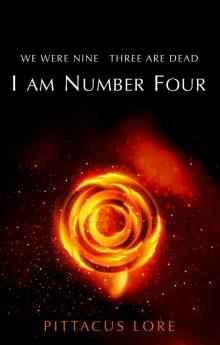 I Am Number Four
I Am Number Four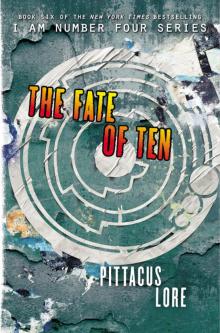 The Fate of Ten
The Fate of Ten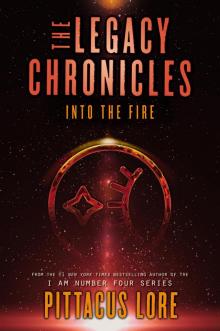 The Legacy Chronicles - Into the Fire
The Legacy Chronicles - Into the Fire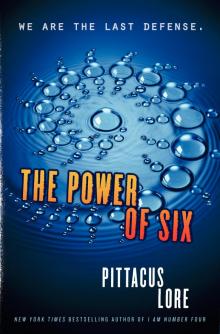 The Power of Six
The Power of Six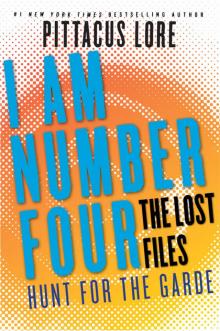 Hunt for the Garde
Hunt for the Garde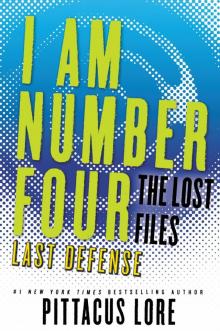 Last Defense
Last Defense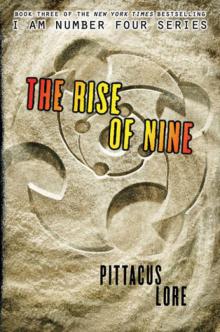 The Rise of Nine
The Rise of Nine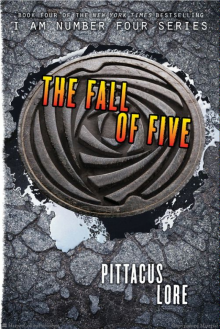 The Fall of Five
The Fall of Five The Fugitive
The Fugitive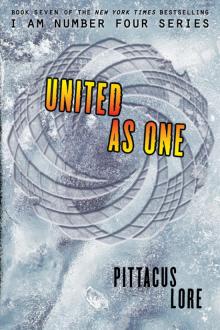 United as One
United as One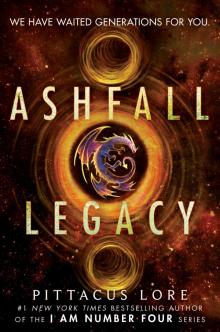 Ashfall Legacy
Ashfall Legacy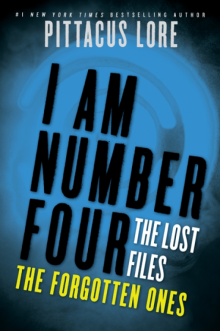 The Forgotten Ones
The Forgotten Ones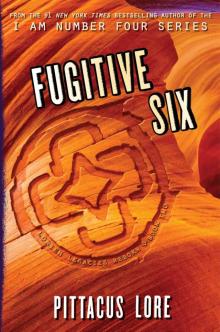 Fugitive Six
Fugitive Six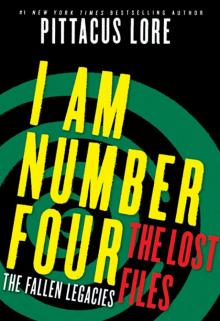 The Fallen Legacies
The Fallen Legacies![[Lorien Legacies 04.95] The Lost Files: Five's Betrayal Read online](http://i1.bookreadfree.com/28/lorien_legacies_04_95_the_lost_files_fives_betrayal_preview.jpg) [Lorien Legacies 04.95] The Lost Files: Five's Betrayal
[Lorien Legacies 04.95] The Lost Files: Five's Betrayal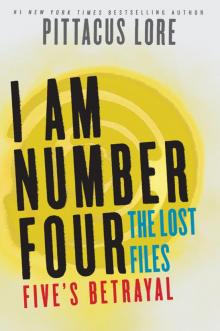 Five's Betrayal
Five's Betrayal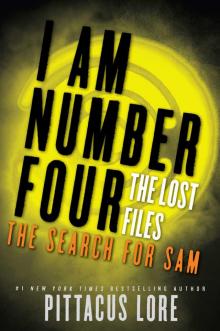 The Search for Sam
The Search for Sam![[Lorien Legacies 04.85] The Lost Files: The Forgotten Ones Read online](http://i1.bookreadfree.com/28/lorien_legacies_04_85_the_lost_files_the_forgotten_ones_preview.jpg) [Lorien Legacies 04.85] The Lost Files: The Forgotten Ones
[Lorien Legacies 04.85] The Lost Files: The Forgotten Ones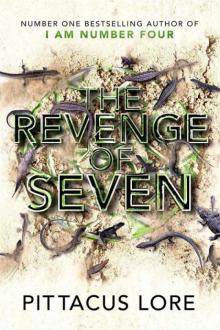 The Revenge of Seven
The Revenge of Seven![[Lorien Legacies 06.3] The Lost Files: Hunt for the Garde Read online](http://i1.bookreadfree.com/07/lorien_legacies_06_3_the_lost_files_hunt_for_the_garde_preview.jpg) [Lorien Legacies 06.3] The Lost Files: Hunt for the Garde
[Lorien Legacies 06.3] The Lost Files: Hunt for the Garde![[Lorien Legacies 04.0] The Fall of Five Read online](http://i1.bookreadfree.com/03/lorien_legacies_04_0_the_fall_of_five_preview.jpg) [Lorien Legacies 04.0] The Fall of Five
[Lorien Legacies 04.0] The Fall of Five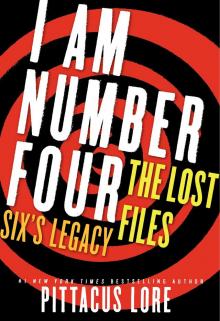 Nines Legacy
Nines Legacy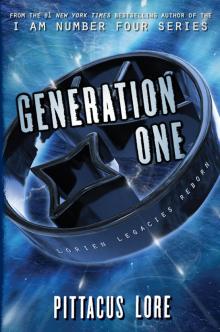 Generation One LLR
Generation One LLR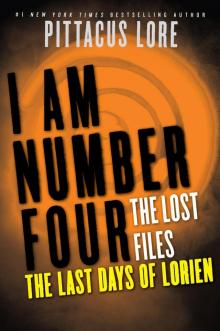 The Last Days of Lorien
The Last Days of Lorien![[Lorien Legacies 05.1] The Lost Files: The Fugitive Read online](http://i1.bookreadfree.com/i/03/14/lorien_legacies_05_1_the_lost_files_the_fugitive_preview.jpg) [Lorien Legacies 05.1] The Lost Files: The Fugitive
[Lorien Legacies 05.1] The Lost Files: The Fugitive![[Lorien Legacies 06.0] The Fate of Ten Read online](http://i1.bookreadfree.com/07/lorien_legacies_06_0_the_fate_of_ten_preview.jpg) [Lorien Legacies 06.0] The Fate of Ten
[Lorien Legacies 06.0] The Fate of Ten![[Lorien Legacies 06.2] The Lost Files: Last Defense Read online](http://i1.bookreadfree.com/08/lorien_legacies_06_2_the_lost_files_last_defense_preview.jpg) [Lorien Legacies 06.2] The Lost Files: Last Defense
[Lorien Legacies 06.2] The Lost Files: Last Defense![[Lorien Legacies 04.9] The Lost Files: Five's Legacy Read online](http://i1.bookreadfree.com/i/03/16/lorien_legacies_04_9_the_lost_files_fives_legacy_preview.jpg) [Lorien Legacies 04.9] The Lost Files: Five's Legacy
[Lorien Legacies 04.9] The Lost Files: Five's Legacy The Navigator
The Navigator![[Lorien Legacies 04.94] The Lost Files: Return to Paradise Read online](http://i1.bookreadfree.com/i/03/13/lorien_legacies_04_94_the_lost_files_return_to_paradise_preview.jpg) [Lorien Legacies 04.94] The Lost Files: Return to Paradise
[Lorien Legacies 04.94] The Lost Files: Return to Paradise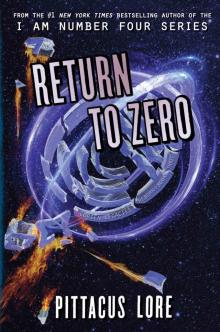 Return to Zero
Return to Zero![[Lorien Legacies 01.5] The Lost Files: The Fallen Legacies Read online](http://i1.bookreadfree.com/09/lorien_legacies_01_5_the_lost_files_the_fallen_legacies_preview.jpg) [Lorien Legacies 01.5] The Lost Files: The Fallen Legacies
[Lorien Legacies 01.5] The Lost Files: The Fallen Legacies![[Lorien Legacies 05.7] The Lost Files: The Guard Read online](http://i1.bookreadfree.com/i/03/13/lorien_legacies_05_7_the_lost_files_the_guard_preview.jpg) [Lorien Legacies 05.7] The Lost Files: The Guard
[Lorien Legacies 05.7] The Lost Files: The Guard![[Lorien Legacies 06.1] The Lost Files: Legacies Reborn Read online](http://i1.bookreadfree.com/i/03/13/lorien_legacies_06_1_the_lost_files_legacies_reborn_preview.jpg) [Lorien Legacies 06.1] The Lost Files: Legacies Reborn
[Lorien Legacies 06.1] The Lost Files: Legacies Reborn![[Lorien Legacies 03.0] The Rise of Nine Read online](http://i1.bookreadfree.com/10/lorien_legacies_03_0_the_rise_of_nine_preview.jpg) [Lorien Legacies 03.0] The Rise of Nine
[Lorien Legacies 03.0] The Rise of Nine![[Lorien Legacies 02.0] The Power of Six Read online](http://i1.bookreadfree.com/i/03/14/lorien_legacies_02_0_the_power_of_six_preview.jpg) [Lorien Legacies 02.0] The Power of Six
[Lorien Legacies 02.0] The Power of Six![[Lorien Legacies 04.6] The Lost Files: The Search for Sam Read online](http://i1.bookreadfree.com/i/03/17/lorien_legacies_04_6_the_lost_files_the_search_for_sam_preview.jpg) [Lorien Legacies 04.6] The Lost Files: The Search for Sam
[Lorien Legacies 04.6] The Lost Files: The Search for Sam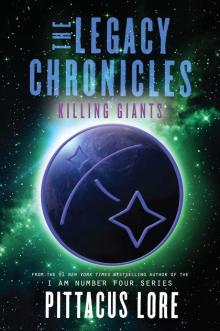 The Legacy Chronicles: Killing Giants
The Legacy Chronicles: Killing Giants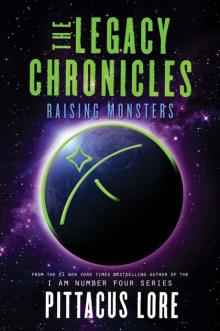 The Legacy Chronicles: Raising Monsters
The Legacy Chronicles: Raising Monsters![[Lorien Legacies 05.4] The Lost Files: The Navigator Read online](http://i1.bookreadfree.com/i/03/17/lorien_legacies_05_4_the_lost_files_the_navigator_preview.jpg) [Lorien Legacies 05.4] The Lost Files: The Navigator
[Lorien Legacies 05.4] The Lost Files: The Navigator![[Lorien Legacies 07.0] United as One Read online](http://i1.bookreadfree.com/i/03/18/lorien_legacies_07_0_united_as_one_preview.jpg) [Lorien Legacies 07.0] United as One
[Lorien Legacies 07.0] United as One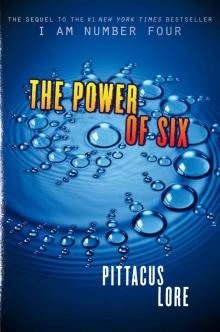 The Power of Six (I Am Number Four)
The Power of Six (I Am Number Four)![[Lorien Legacies 03.5] The Lost Files: Nine's Legacy Read online](http://i1.bookreadfree.com/i/03/18/lorien_legacies_03_5_the_lost_files_nines_legacy_preview.jpg) [Lorien Legacies 03.5] The Lost Files: Nine's Legacy
[Lorien Legacies 03.5] The Lost Files: Nine's Legacy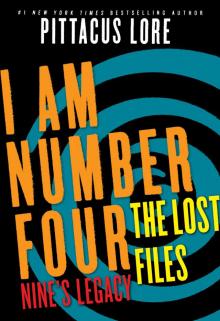 I Am Number Four: The Lost Files: Nine’s Legacy
I Am Number Four: The Lost Files: Nine’s Legacy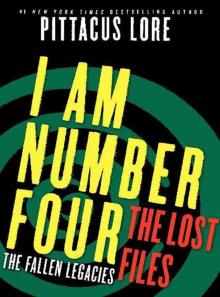 The Lost Files: The Fallen Legacies (i am number four)
The Lost Files: The Fallen Legacies (i am number four)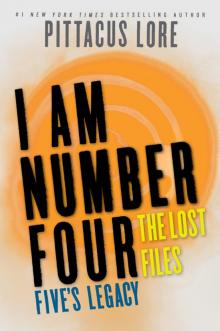 Five's Legacy
Five's Legacy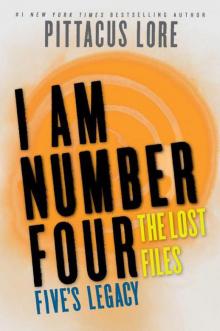 I Am Number Four: The Lost Files: Five's Legacy
I Am Number Four: The Lost Files: Five's Legacy![[Lorien Legacies 05.0] The Revenge of Seven Read online](http://i1.bookreadfree.com/i1/03/30/lorien_legacies_05_0_the_revenge_of_seven_preview.jpg) [Lorien Legacies 05.0] The Revenge of Seven
[Lorien Legacies 05.0] The Revenge of Seven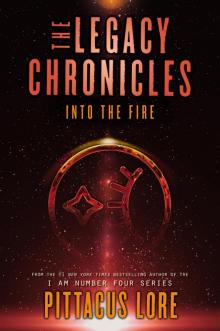 The Legacy Chronicles
The Legacy Chronicles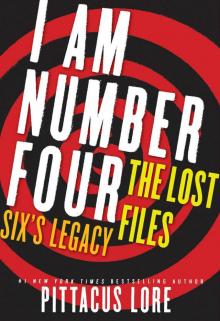 The Lost Files: Six's Legacy
The Lost Files: Six's Legacy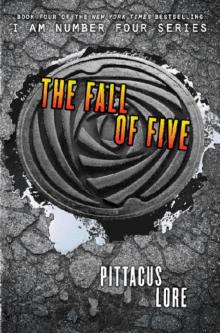 The Fall of Five (I Am Number Four)
The Fall of Five (I Am Number Four)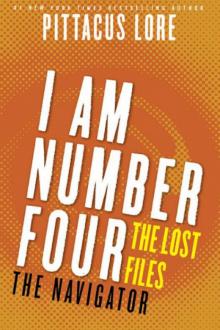 The Lost Files: The Navigator
The Lost Files: The Navigator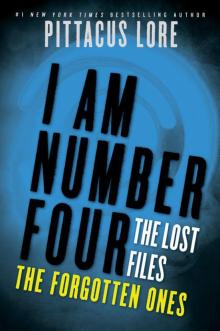 I Am Number Four: The Lost Files: The Forgotten Ones
I Am Number Four: The Lost Files: The Forgotten Ones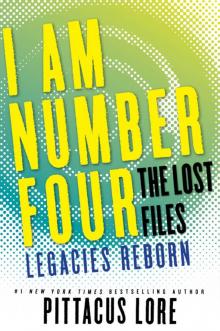 Legacies Reborn
Legacies Reborn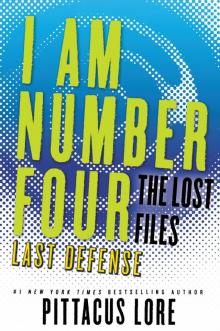 I Am Number Four: The Lost Files: Last Defense
I Am Number Four: The Lost Files: Last Defense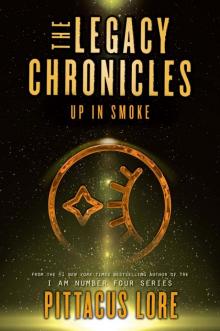 The Legacy Chronicles_Up in Smoke
The Legacy Chronicles_Up in Smoke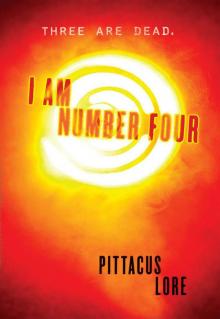 I Am Number Four ll-1
I Am Number Four ll-1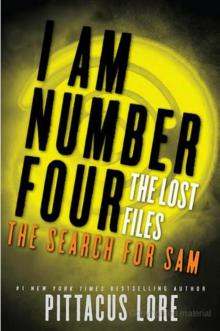 The Search for Sam lltlf-4
The Search for Sam lltlf-4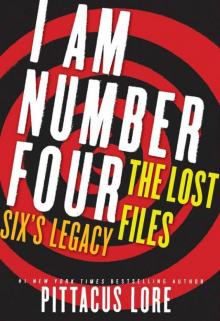 The Lost Files: Six's Legacy (lorien legacies)
The Lost Files: Six's Legacy (lorien legacies)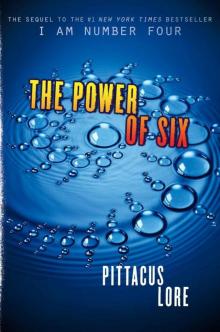 The Power of Six tll-2
The Power of Six tll-2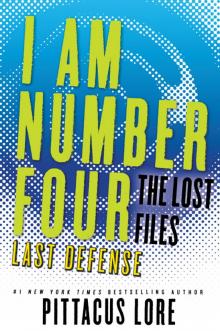 I Am Number Four: The Lost Files #14
I Am Number Four: The Lost Files #14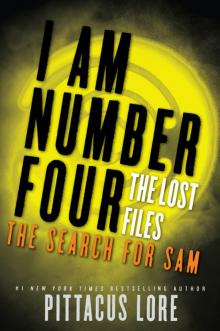 I Am Number Four: The Lost Files: The Search for Sam
I Am Number Four: The Lost Files: The Search for Sam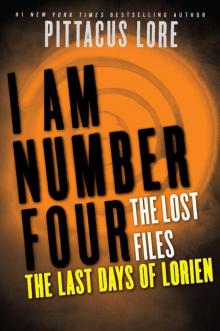 I Am Number Four: The Lost Files: The Last Days of Lorien
I Am Number Four: The Lost Files: The Last Days of Lorien